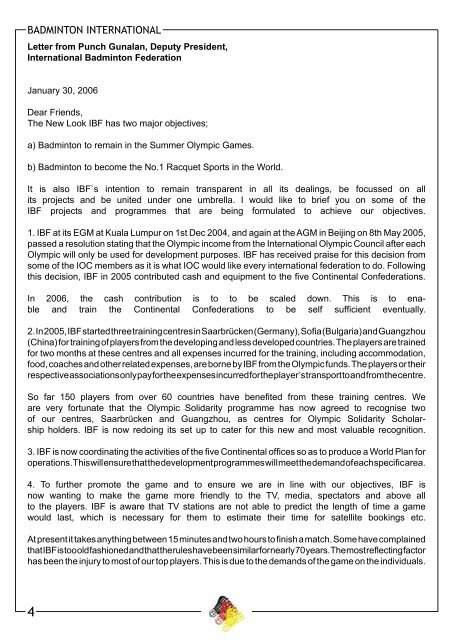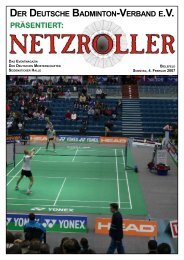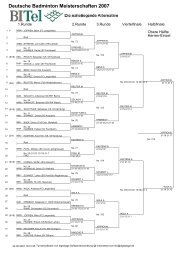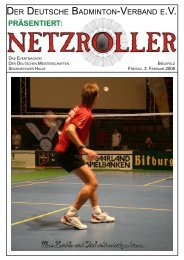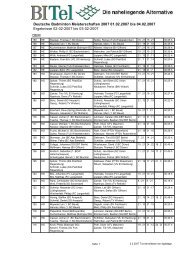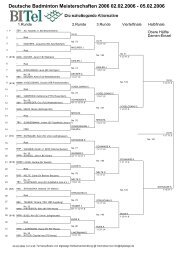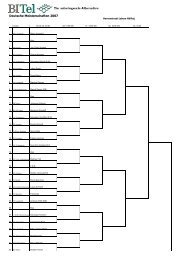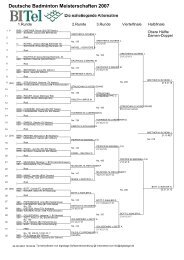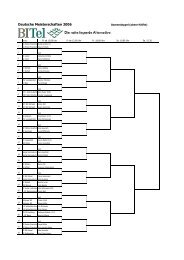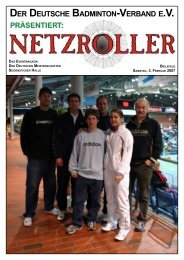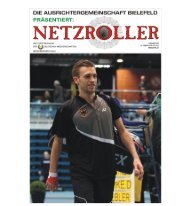Das ist bitter - Deutsche Badminton Meisterschaft
Das ist bitter - Deutsche Badminton Meisterschaft
Das ist bitter - Deutsche Badminton Meisterschaft
You also want an ePaper? Increase the reach of your titles
YUMPU automatically turns print PDFs into web optimized ePapers that Google loves.
<strong>Badminton</strong> international<br />
Letter from Punch Gunalan, Deputy President,<br />
International <strong>Badminton</strong> Federation<br />
January 30, 2006<br />
Dear Friends,<br />
The New Look IBF has two major objectives;<br />
a) <strong>Badminton</strong> to remain in the Summer Olympic Games.<br />
b) <strong>Badminton</strong> to become the No.1 Racquet Sports in the World.<br />
It is also IBF`s intention to remain transparent in all its dealings, be focussed on all<br />
its projects and be united under one umbrella. I would like to brief you on some of the<br />
IBF projects and programmes that are being formulated to achieve our objectives.<br />
1. IBF at its EGM at Kuala Lumpur on 1st Dec 2004, and again at the AGM in Beijing on 8th May 2005,<br />
passed a resolution stating that the Olympic income from the International Olympic Council after each<br />
Olympic will only be used for development purposes. IBF has received praise for this decision from<br />
some of the IOC members as it is what IOC would like every international federation to do. Following<br />
this decision, IBF in 2005 contributed cash and equipment to the five Continental Confederations.<br />
In 2006, the cash contribution is to to be scaled down. This is to enable<br />
and train the Continental Confederations to be self sufficient eventually.<br />
2. In 2005, IBF started three training centres in Saarbrücken (Germany), Sofia (Bulgaria) and Guangzhou<br />
(China) for training of players from the developing and less developed countries. The players are trained<br />
for two months at these centres and all expenses incurred for the training, including accommodation,<br />
food, coaches and other related expenses, are borne by IBF from the Olympic funds. The players or their<br />
respective associations only pay for the expenses incurred for the player’s transport to and from the centre.<br />
So far 150 players from over 60 countries have benefited from these training centres. We<br />
are very fortunate that the Olympic Solidarity programme has now agreed to recognise two<br />
of our centres, Saarbrücken and Guangzhou, as centres for Olympic Solidarity Scholarship<br />
holders. IBF is now redoing its set up to cater for this new and most valuable recognition.<br />
3. IBF is now coordinating the activities of the five Continental offices so as to produce a World Plan for<br />
operations. This will ensure that the development programmes will meet the demand of each specific area.<br />
4. To further promote the game and to ensure we are in line with our objectives, IBF is<br />
now wanting to make the game more friendly to the TV, media, spectators and above all<br />
to the players. IBF is aware that TV stations are not able to predict the length of time a game<br />
would last, which is necessary for them to estimate their time for satellite bookings etc.<br />
At present it takes anything between 15 minutes and two hours to finish a match. Some have complained<br />
that IBF is too old fashioned and that the rules have been similar for nearly 70 years. The most reflecting factor<br />
has been the injury to most of our top players. This is due to the demands of the game on the individuals.<br />
4


